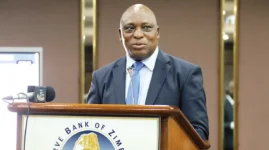According to Reporters Without Borders, Zimbabwe's press freedom has faced more challenges since President Mnangagwa won another election in 2023. This group, which works to protect free information rights, ranked Zimbabwe at number 116 out of 180 countries in its Global Press Freedom Index. The best country is number 1.
The report notes that although access to information has grown and self-censorship has decreased, media workers experience more harassment following the president's re-election.
The report comes at the same time as Alpha Media Holdings journalist Blessed Mhlanga was arrested. He stands accused of encouraging violence through broadcasts featuring war veteran Blessed Geza, who opposes President Mnangagwa, on the HStv broadcast channel.
Since Mnangagwa took power, many private media reporters have been arrested on political charges. These include Hopewell Chinono, Garikai Mafirakureva, Wisdom Mudzungairi, and others.
Government-controlled media still dominates the landscape. Their journalists rarely face the same treatment as those working for private outlets. Independent news exists through online sites like Zimlive and The Newshawks, plus 14 community radio stations.
Reporters Without Borders points out that very strict laws remain in effect. Even when new laws replace old ones, they contain equally harsh rules. The updated penal code, the Official Secrets Act, and the new Cyber Security and Data Protection Act all restrict journalism.
In June 2023, the government passed a dangerous "patriotic bill" that makes it illegal to "attack sovereignty and national interest," creating threats to journalists' work.
The group also mentions that Zimbabwe's economic problems hold back media development. Starting a new media company costs far too much for most investors. TV channel licensing fees can reach tens of thousands of dollars yearly.
This situation helps the government maintain control, with about 70% of print and broadcast media under state control. Journalists earn low pay, making them vulnerable to accepting bribes, which damages their independence.
The report notes that although access to information has grown and self-censorship has decreased, media workers experience more harassment following the president's re-election.
The report comes at the same time as Alpha Media Holdings journalist Blessed Mhlanga was arrested. He stands accused of encouraging violence through broadcasts featuring war veteran Blessed Geza, who opposes President Mnangagwa, on the HStv broadcast channel.
Since Mnangagwa took power, many private media reporters have been arrested on political charges. These include Hopewell Chinono, Garikai Mafirakureva, Wisdom Mudzungairi, and others.
Government-controlled media still dominates the landscape. Their journalists rarely face the same treatment as those working for private outlets. Independent news exists through online sites like Zimlive and The Newshawks, plus 14 community radio stations.
Reporters Without Borders points out that very strict laws remain in effect. Even when new laws replace old ones, they contain equally harsh rules. The updated penal code, the Official Secrets Act, and the new Cyber Security and Data Protection Act all restrict journalism.
In June 2023, the government passed a dangerous "patriotic bill" that makes it illegal to "attack sovereignty and national interest," creating threats to journalists' work.
The group also mentions that Zimbabwe's economic problems hold back media development. Starting a new media company costs far too much for most investors. TV channel licensing fees can reach tens of thousands of dollars yearly.
This situation helps the government maintain control, with about 70% of print and broadcast media under state control. Journalists earn low pay, making them vulnerable to accepting bribes, which damages their independence.












